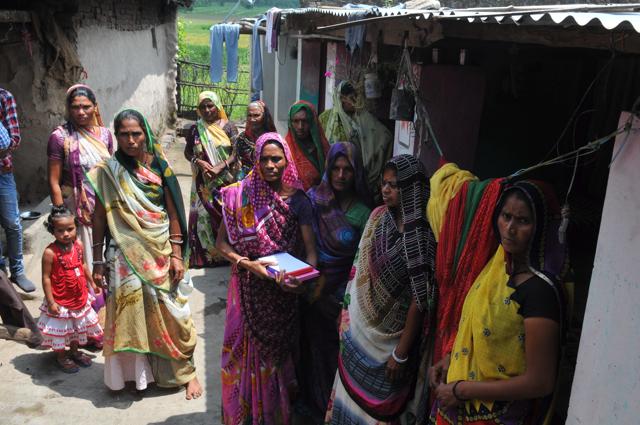Financial inclusion: Indian women have something to bank on
We must build on this success to extend the gains to other important financial services such as insurance and credit
For the first time, the majority of Indian women have been financially included. Fresh data show that the proportion of Indian women with individual accounts in formal financial institutions (primarily banks) reached 61% in 2015, a sharp increase from 48% in 2014, lagging men by only eight percentage points. A close look at these numbers reveals opportunities and challenges to build on this quiet, and important, victory.

The Intermedia India Financial Inclusion Insights (FII), an annual, nationally representative survey, confirms that both individuals and households show growth in bank registration, largely driven by the government’s Pradhan Mantri Jan Dhan Yojana (PMJDY) and its emphasis on individual accounts (rather than household). By capturing demand-side data from individual citizens, the FII survey found that overall individual bank account ownership in India increased from 52% in mid-2014 to 63% in mid-2015. While the survey shows growth in financial inclusion for all adults, the gains were the highest in rural areas and for individuals below the poverty line, and, most of all, women. These encouraging numbers suggest financial inclusion is widening to reach the most vulnerable adults in India. Additionally the gender gap has decreased, as Indian men experienced an increase of nine percentage points, from 60% to 69% in the same period. These data mirror other recent studies such as Anjini Kochar’s finding that business correspondents (BCs) have increased the savings of both landowning and landless households in India; with the savings of the landless increasing more than those of landowning households. She explains this difference in terms of the fact that access to a BC increased the wage income and hours of work of landless households, particularly those of women, a likely consequence of the tie-up between the financial system and the MGNREGA.
Read: Govt funding not enough for people fighting against poverty
So, what does this mean for the broader pursuit of economic empowerment for women in India? Does account ownership translate into broader economic and social gains? We looked at evidence from multiple studies and the conclusions are clear — women and their families benefit greatly from individual account ownership. Esther Duflo’s study of South African pensions reveals that when the pension recipient is a woman in the household, it translates into strong health effects for girls in the family. Pascaline Dupas, in her work in Kenya, shows that access to fairly simple savings tools has a significant impact on health-related investments of families. Silvia Prina, in a randomised experiment in Nepal, offered flexible savings accounts to female-headed households with no opening, deposit or withdrawal fees. After one year, the study found that 80% of those offered the account opened one and used it actively. After one year, household assets had increased by 16%. All these studies strongly suggest that the gender of the account-holder matters and drives differential outcomes for the family. As a universally targeted programme, women’s empowerment and economic inclusion were not direct objectives of the PMJDY. But the programme design of targeting individual accounts, and the disproportionate impact this focus has on women’s empowerment and economic inclusion, may prove to be one of the PMJDY’s most lasting and transformative features.
Read: Jan Dhan Yojana accounts on radar of cyber criminals
This remarkable achievement for women should now be extended to the remaining 39% of them. This will require commitment to implementation, quality of service, and a willingness to look beyond one-size-fits-all solutions in addressing the diversity of women’s financial needs. For women, some of the features valued most in formal accounts are trust, privacy, and security from theft and harassment. When providers do not treat their customers in a fair manner — particularly low-income customers and women — trust in financial services is eroded. Experience has shown that efforts such as the “no-frill accounts” were abandoned by clients when payments were not received in time, and customers lost confidence in their financial providers. In the FII data, PMJDY holders reported experiencing issues with transactions and account terms. Specifically, they were more likely to complain about banks deducting fees without informing them, and a decrease in available account funds due to mishandling or fraudulent activities. A commitment to customer protection in implementation, and thinking through women’s needs at all stages, are one way to ensure sustainable growth and outreach.
Read: Eyeing women voters, Rawat govt plans cash boost to self-help groups
In addition, while technology and digital finance offer a promising solution to some of the traditional physical and other access barriers to extending financial inclusion to all of India’s women, women face a stark “digital divide”. To date only 44% of women — compared to 75% of men — own an individual mobile phone, and the simple difference between owning a phone and being able to “borrow one” plays a significant role in women’s technological skills development and privacy in financial transactions.
Read: Women take the lead in three MP villages to bring about change
Ensuring that first-time users learn that banking is an experience of convenience and trust, and recognising the diversity of needs of Indian women in accessing financial services are the only ways to continue the remarkable trajectory of financial inclusion for women. We must build on this success to extend the gains to other important financial services such as insurance and credit. In this same FII survey, only 15% of women reported having a financial plan for unexpected events. Inability to deal with these events can be devastating for women and their families.
Bindu Ananth is Chair of the IFMR Finance Foundation and Amy Jensen Mowl is its Financial Inclusion Specialist
The views expressed are personal



